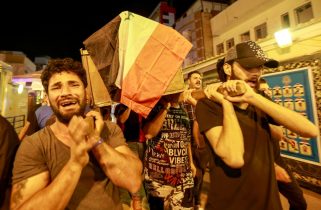
October 2, 2019
By Ahmed Rasheed and Ahmed Aboulenein
BAGHDAD (Reuters) – Five people were killed and at least 132 wounded on Wednesday in renewed nationwide clashes between demonstrators and Iraqi security forces, the largest display of public anger against Prime Minister Adel Abdul Mahdi’s year-old government.
Domestic instability coupled with regional tensions could prove to be the final nail in the coffin of Abdul Mahdi’s fragile coalition government, sworn in last year as a compromise between rival factions after an inconclusive election.
The protests, which started on Tuesday over unemployment, corruption, and poor public services, have escalated, with many chanting for the “fall of the regime”, a slogan first popularized during the 2011 Arab Spring uprisings.
“We are demanding a change, we want the downfall of the whole government,” said one protester in Baghdad who declined to identify himself for fear of reprisal.
Any power vacuum in Iraq, should the government be toppled, could prove challenging for the region, given Iraq’s rare status as an ally of both Washington and Tehran who are currently embroiled in a standoff.
Islamic State militants could also take advantage of a lack of central control and thousands of U.S. troops are stationed in the country in positions not far from those of Iran-allied Shi’ite militias.
Five more people were killed or died from their wounds on Wednesday, taking the toll to at least seven after as least two people were killed and 200 wounded on Tuesday.
An Interior Ministry spokesman said one child was killed on Wednesday when a protester threw a bottle filled with gasoline at a vehicle carrying civilian passengers in Zafaraniya district of southeast Baghdad. Another was killed in the southern city of Emara.
Two protesters were shot dead in the southern city of Nassiriya when police opened fire to disperse demonstrators, local health sources told Reuters. Another protester died of their wounds, police and health sources said.
Police and the army opened fire and launched tear gas canisters to disperse hundreds of protesters all over Baghdad. Protesters blocked the main highway connecting the capital to Iraq’s northern provinces.
Protests also erupted all over southern Iraq – heartland of the Shi’ite Muslim majority who after years of voting along sectarian lines are turning on their political leaders for failing to deliver jobs and basic services.
Protesters set fire near the municipality building in Nassiriya and police used live fire to disperse them. In Kut, protesters tried to break into the municipality building, and hundreds were out on the streets of Hilla and Diwaniya while dozens gathered in the Shi’ite holy city of Najaf.
Thousands gathered in the oil-rich city of Basra in front of the provincial administration building but so far protests there were peaceful. There were peaceful protests in Samawa.
Small protests also took place in the northern cities of Kirkuk and Tikrit, as well as the eastern province of Diyala.
Social media platforms Facebook, Twitter and Instagram, as well as messaging application WhatsApp all appeared to be have been disabled across Iraq with the exception of the semi-autonomous Kurdistan Region which has separate internet infrastructure.
The services were only accessible by using a VPN, which effectively disguises the location of a device. It was not immediately possible to reach government officials for comment.
EMERGENCY MEETING
Abdul Mahdi on Wednesday chaired an emergency meeting of the national security council, which later issued a statement regretting deaths on injuries on both sides during Tuesday’s protests and affirming the right to protest and freedom of expression. It made no mention of Wednesday’s protests.
“The council affirms the right to protest, freedom of expression, and the protesters’ legitimate demands, but at the same time condemns the acts of vandalism that accompanied the protests,” it said.
Appropriate measures to protect citizens, public, and private property would be taken, it added.
Security forces blocked several roads in Baghdad, including a bridge that leads to the fortified Green Zone, which houses government buildings and foreign embassies, as part of tightened security measures, a security source said.
“Our demands? We want work, we want to work. If they do not want to treat us as Iraqis, then tell us we are not Iraqi and we will find other nationalities and migrate to other countries,” said one protester in eastern Baghdad.
In a bid to cool tempers, Abdul Mahdi on Tuesday promised jobs for graduates. He instructed the Oil Ministry and other government bodies to include a 50% quota for local workers in subsequent contracts with foreign companies.
Oil-rich Iraq has suffered hardships for decades, from rule by Saddam Hussein including years subject to U.N. sanctions, to the 2003 U.S. invasion and civil war it unleashed, and then the battle against Islamic State, which was declared won in 2017.
Graft is widespread and basic services such as power and water are lacking.
A government statement on Tuesday said 40 members of the security forces were among those injured and blamed “groups of inciting riots” for the violence. At least 11 members of security forces were injured on Wednesday.
The United Nations on Wednesday expressed concern over the violence and urged calm. The U.S. Embassy in Baghdad urged all sides to avoid violence.
(Reporting by Ahmed Rasheed; Additional reporting by Thaier al-Sudani, Maher Nazeh, Khaled Abdul Qader, and Haider Kadhim, and Ahmed Aboulenein in Baghdad, Aref Mohammed in Basra, Mustafa Mahmoud in Kirkuk, Ghazwan Hassan in Tikrit, Ali al-Rubaie in Hilla, Adam Hadi in Baquba; Writing by Ahmed Aboulenein; Editing by William Maclean)





